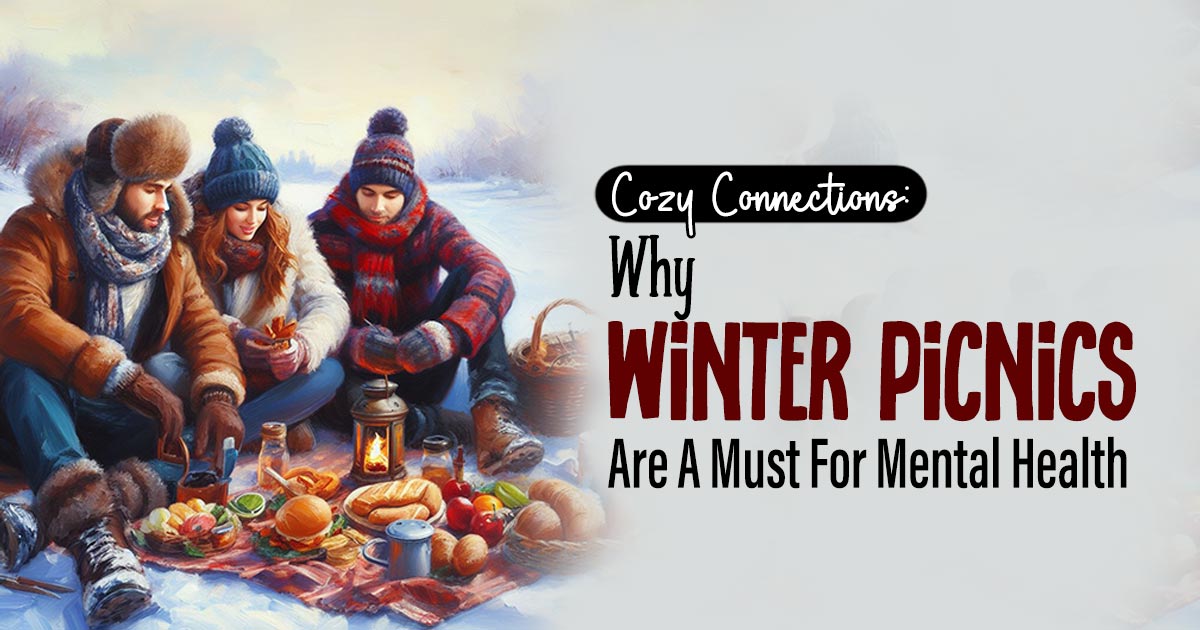As winter blankets the world in a serene layer of snow, the mental health landscape experiences its unique set of challenges. The colder months often bring a sense of coziness and festive cheer, yet for many, they can also be accompanied by a decline in mental well-being. This is where outdoor social activities, like winter picnics, can come to the rescue.
Mental Health Disorders Associated With Winters
Winter is notorious for being a harbinger of mental health challenges, with seasonal affective disorder (SAD) taking center stage. SAD is a form of depression that occurs seasonally, most commonly during the winter months. The reduced sunlight exposure disrupts the body’s internal clock, affecting serotonin and melatonin levels, leading to symptoms such as low energy, irritability, and a persistent low mood.
Additionally, conditions like cabin fever, characterized by restlessness and irritability due to prolonged indoor confinement, and heightened stress levels during the holiday season contribute to the mental health complexity of winter.
Moreover, the winter blues are not solely limited to SAD; conditions like anxiety and social isolation can intensify during this period. The colder weather and the allure of hibernation can lead to social withdrawal, exacerbating feelings of loneliness and melancholy. Understanding the mental health landscape of winter is crucial to devising strategies that counteract the negative impacts and promote overall well-being.
Importance Of Socializing During The Winter Seasons
Socialization remains a key factor in maintaining positive mental health, particularly during the winter months when the inclination to retreat indoors is strong. Winter tends to create a natural barrier to outdoor activities, making the effort to connect with others even more crucial. Human connection, whether virtual or in person, serves as a powerful antidote to the feelings of isolation that can intensify during the colder seasons.
Participating in social activities during winter is not just a matter of leisure; it is an essential component of mental health maintenance. Engaging in social interactions provides emotional support, combats loneliness, and fosters a sense of belonging. It can act as a buffer against the impact of winter-related mental health disorders, creating a support network that understands and mitigates the challenges unique to this season.
How Do Outdoor Social Activities Like Winter Picnics Boost Our Mental Health?
Winter picnics and outdoor social activities emerge as antidotes to the mental health challenges posed by the cold season. The benefits extend beyond the physical act of being outdoors; they encompass the holistic experience of communing with nature and sharing moments of joy with others.
Firstly, the exposure to natural light during winter picnics directly addresses the serotonin and melatonin imbalances associated with Seasonal Affective Disorder. Sunlight, even in its muted winter form, stimulates the production of serotonin, the neurotransmitter responsible for regulating mood. This boost in serotonin, coupled with the physical activity involved in outdoor picnics, contributes to an improved overall sense of well-being.
Secondly, the act of socializing during winter picnics counters the isolation that often accompanies colder seasons. Human connection is a potent remedy for loneliness, and sharing a meal outdoors provides an opportunity for meaningful conversations and shared laughter. The communal aspect of a winter picnic fosters a sense of togetherness, strengthening social bonds and creating positive memories that can help combat the winter blues.
Tips For Participating In Social Activities During The Colder Months
Consider the following tips for participating in social activities during the colder months:
- Choose Cozy Locations: Opt for winter-friendly venues with amenities like fire pits, warm blankets, and heated seating to make the experience comfortable.
- Plan Daytime Activities: Take advantage of the limited daylight hours by planning social activities during the day to maximize exposure to natural light.
- Dress In Layers: Stay warm by dressing in layers, ensuring that you can adjust your clothing to accommodate changing temperatures.
- Bring Comfort Food: Pack warm beverages and comfort food to enhance the cozy atmosphere and create a sense of indulgence.
- Include Outdoor Games: Incorporate winter-friendly games like snowball fights, sledding, or ice skating to add a playful and active element to the gathering.
- Encourage Open Communication: Create an environment where participants feel comfortable sharing their feelings and experiences, fostering connection and emotional support.
- Embrace The Winter Aesthetic: Decorate the outdoor space with winter-themed elements like fairy lights, candles, and seasonal decorations to enhance the festive ambiance.
- Stay Mindful Of Safety: Be mindful of the weather conditions and ensure that the chosen location is safe for outdoor activities. Dress warmly and be prepared for changing weather.
- Choose Warm Beverages: Hot drinks like cocoa, tea, or mulled cider can add warmth and comfort to the gathering.
- Include Relaxation Elements: Integrate elements of relaxation, such as meditation or stargazing, to enhance the mental health benefits of the outdoor experience.
Winter picnics and outdoor social activities stand as powerful allies in the battle against the winter blues and mental health challenges that often accompany the colder months. By understanding the unique landscape of mental health in winter and acknowledging the disorders associated with this season, we can appreciate the significance of intentional socialization.
As we navigate the colder seasons, these activities serve as beacons of warmth, encouraging connections, joy, and shared experiences that contribute to a resilient and positive mental state.


